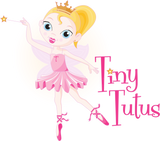How Tiny Tutus Ballet Classes Support Early Childhood Development
How Tiny Tutus Ballet Classes Support Early Childhood Development
Tiny Tutus ballet classes are designed to support early childhood development from 16 months of age. With a curriculum grounded in education and movement science, our program helps toddlers build coordination, confidence, emotional regulation, memory, and social connection. Dance is development in motion, tailored to the preschool years.
It's easy to think ballet is all about pointed toes and pretty costumes, and at Tiny Tutus, yes, we adore both. But behind the sparkle is something far more powerful: real early childhood learning.
Educators and dancers create Tiny Tutus ballet classes to support your child's physical, emotional, social, and cognitive development from the very beginning. Whether your ballerina is 16 months or nearly 5, every class is full of age-appropriate developmental gold.
Why Dance Is So Powerful for Little Brains and Bodies
From the moment your toddler enters a Tiny Tutus class, their body and brain are working together in beautiful ways. Tiny Tutus ballet and dance program supports key developmental areas:
Cognitive Development
- Remembering simple patterns
- Recognising music and rhythm
- Processing teacher instructions
- Practising imagination and sequencing through storytelling
Social and Emotional Growth
- Learning to take turns
- Managing feelings in a group setting
- Building independence from caregivers
- Developing resilience and confidence
Motor Skill Development
- Improving balance, strength, and posture
- Coordinating arms and legs with music
- Practising gentle movement that supports joint safety and control
Language and Listening
- Following directional songs
- Identifying musical cues
- Expanding vocabulary through themed lessons and gestures
Designed by Educators, Not Just Dancers
Our curriculum was co-created by an expert team:
- Bronwyn Helmore, a classically trained ballerina and Royal Academy of Dance graduate
- Simone Cadell, an early childhood education specialist
- Endorsed by Debbie Bradbery, Conjoint Lecturer in Education at the University of Newcastle, who confirmed the curriculum's alignment with the NSW Quality Teaching Framework
Every aspect of the class, from the teacher's greeting to the sequence of activities, has been carefully designed to support how young children learn best.
Real Education, Real Fun
One of the biggest myths we hear is that ballet for toddlers is just a bit of cute fun. While it absolutely is fun, and joy is a key part of early learning, our program is much more than that.
Every plié, skip, and fairy run is helping your child:
- Regulate their emotions
- Develop problem-solving skills
- Feel confident in their own body
- Learn how to be part of a group
Tiny Tutus is purposeful.
What Parents See Over Time
Our families tell us:
"She's standing taller, smiling more, and learning how to listen. I didn't expect ballet to help with that." (Kim, Mum to Evelyn 3 years old)
Or:
"He was really unsure at first, but now he knows the whole warm-up by heart and shows his little sister at home." (Maddi, Mum to Noah 2.5 years old)
That's early development in action, and it's one of the most beautiful parts of the Tiny Tutus journey.
Final Thought
If you're looking for an activity that's as meaningful as it is magical, ballet with Tiny Tutus might be the perfect fit.
Our classes are designed to do more than entertain; they're built to educate, uplift, and gently support every ballerina's unique growth and development.
